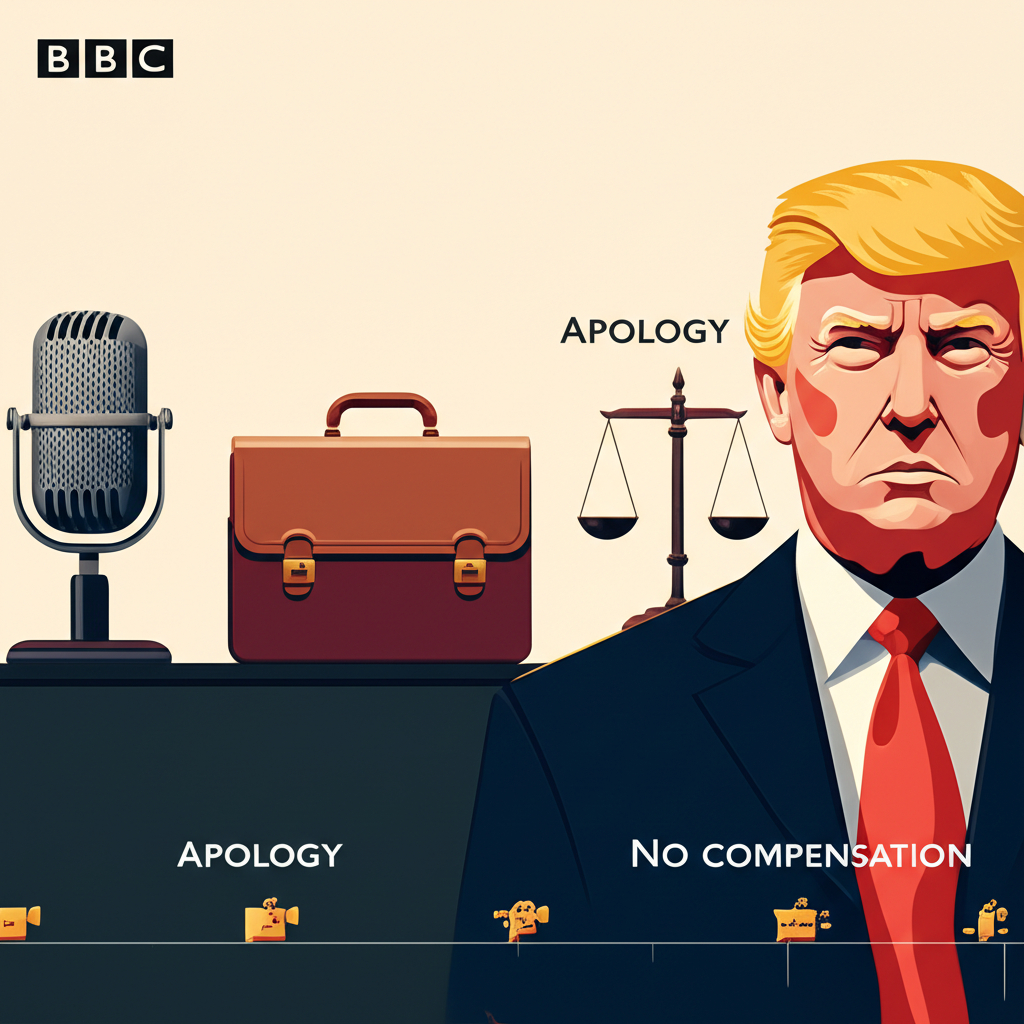The British Broadcasting Corporation (BBC) has issued a formal apology to former US President Donald Trump over a controversial edit in a Panorama episode that spliced parts of his January 6, 2021, speech. However, the UK’s public broadcaster has firmly rejected Trump’s subsequent demands for a staggering $1 billion in compensation, setting the stage for a potentially protracted legal battle, according to reports from BBC News and The Guardian.
Apology Issued, Compensation Denied
The BBC’s apology centers on a Panorama documentary from October 2024, which featured edited excerpts of Trump’s speech delivered prior to the Capitol riot. Trump’s legal team had sent a letter to the BBC on Sunday, demanding a “full and fair retraction” of the documentary, an apology, and that the broadcaster “appropriately compensate President Trump for the harm caused,” as detailed by BBC News. The deadline for compliance was set for November 14, 2025.
In its response, the BBC acknowledged an “error of judgment” regarding the manner in which the video clip was edited. “While the BBC sincerely regrets the manner in which the video clip was edited, we strongly disagree there is a basis for a defamation claim,” the broadcaster stated, as reported by Reuters and The Guardian. This nuanced apology concedes a journalistic misstep without accepting legal liability for defamation, directly countering Trump’s demand for a $1 billion payout, which his lawyers threatened to pursue if the BBC did not comply.
The Political and Legal Context
The controversy stems from the Panorama episode’s depiction of Trump’s January 6, 2021, speech, which his legal team asserted was edited to falsely suggest he incited violence. This is not the first time Trump has engaged in legal action or threats against media organizations, often characterizing critical coverage as “fake news” or defamatory. The current dispute underscores the ongoing tension between political figures and news outlets, particularly concerning editorial control and journalistic integrity.
The BBC’s decision to apologize for the editing technique but deny compensation reflects its commitment to media ethics while simultaneously defending against what it perceives as an unfounded legal claim. Sky News reported that the initial edit, which suggested Trump incited violence, had even prompted the resignation of some BBC personnel, highlighting the internal gravity of the error.

Significant Hurdles for a Defamation Claim
Legal experts widely agree that Donald Trump faces substantial obstacles should he pursue a defamation lawsuit against the BBC. According to Professor Lyrissa Lidskey of the University of Florida Levin College of Law, a plaintiff like Trump would need to prove he actually suffered $1 billion in losses to be awarded such enormous damages in a Florida court, as cited by BBC News. US press freedom laws are notably robust, requiring public figures to prove not only that a statement was false and defamatory but also that the defendant acted with “actual malice”—meaning they knew the statement was false or recklessly disregarded the truth, Reuters noted.
"President Trump will be left with no alternative but to enforce his legal and equitable rights, all of which are expressly reserved and are not waived, including by filing legal action for no less than $1,000,000,000 (One Billion Dollars) in damages," – Trump’s legal team letter to BBC, as reported by BBC News.
Furthermore, legal analysts from PBS NewsHour and CBC News have pointed out that the BBC could argue that Trump was not harmed by the documentary because he was ultimately re-elected president in 2024. This argument challenges the core premise of a defamation claim, which requires demonstrable damage to reputation or financial standing. Mark Stephens, a media lawyer, suggests that such a case could “test how far cross-border journalism is protected from political retaliation,” and might reveal as much about Trump’s “use of litigation as a political weapon” as it does about media accountability, according to Newsweek.
Implications for Journalism and Political Figures
This high-profile dispute carries significant implications for the landscape of international journalism and the interaction between powerful political figures and media organizations. The BBC’s willingness to apologize for an editing error, while staunchly defending against a defamation claim, sets a precedent for how major broadcasters navigate such challenges. It highlights the fine line between admitting a mistake and ceding to demands that could undermine editorial independence.
For political figures like Trump, the use of large-scale legal threats against media outlets remains a potent, if often difficult, strategy. The outcome of any potential lawsuit, or even the decision not to pursue one, will be closely watched by media lawyers, journalists, and politicians worldwide. It could influence future editorial practices, particularly regarding the use of archival footage and the standards for editing speeches or public statements. This case also brings into focus the challenges of cross-border defamation claims, given differing legal frameworks and protections for free speech.
The Road Ahead
As the November 14 deadline passes without the BBC acceding to Trump’s full demands, the focus now shifts to whether Trump’s legal team will indeed file the promised $1 billion lawsuit. While a White House spokeswoman Karoline Leavitt initially stated that Trump’s external legal counsel had filed the lawsuit, Reuters later clarified that it had not yet been filed, emphasizing the fluidity of the situation. The complexity of proving actual damages and actual malice, coupled with the robust legal defenses available to media organizations, suggests that any such lawsuit would be an arduous and expensive undertaking.
Ultimately, this episode serves as a critical test for media accountability and the boundaries of journalistic practice in an era of heightened political polarization. The BBC’s measured response, combining regret for a demonstrable error with a firm defense of its broader editorial integrity, seeks to balance its public service mission with the legal and political pressures exerted by powerful figures.









